Clinton, Bill (1946-…), served as president of the United States from 1993 to 2001. Clinton, a Democrat, won the 1992 election while serving his fifth term as governor of Arkansas. President George H. W. Bush was his Republican opponent. Clinton won reelection in 1996, when former Senator Robert Dole of Kansas was his Republican foe.
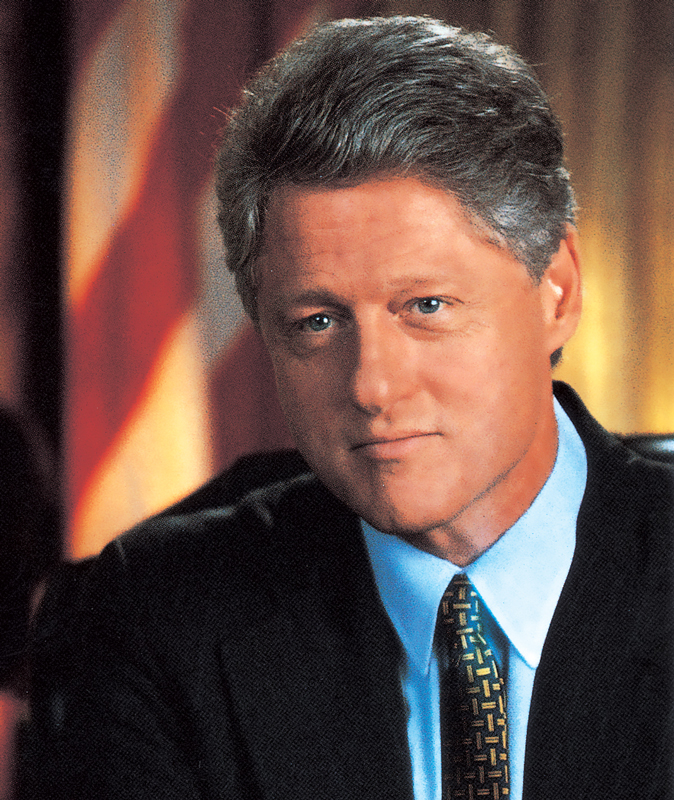
Clinton took office at a time when the nation’s attention had shifted sharply from foreign affairs to domestic issues. The years before his election had seen a series of turbulent world events, including the end of the Cold War struggle between the United States and the Soviet Union, and—in 1991—the breakup of the Soviet Union itself. By 1992, Americans were troubled chiefly by fears about their country’s economic health. The unemployment rate had climbed to the highest level since 1984. Many people were concerned about what they saw as a decline in U.S. productivity compared with that of other nations. Another concern involved the federal government’s policy of deficit spending, or borrowing to finance expenditures, which over the years had resulted in a large national debt. In addition, Americans had become increasingly frustrated over signs of growing racial conflict, crime, and poverty.
During his two campaigns, Clinton argued that he was the best candidate to solve the country’s economic and social problems. He promised to reduce the need for deficit spending and to expand the educational and economic opportunities of poor and middle-class Americans. Clinton’s positions included both traditionally liberal and traditionally conservative ideas. He once declared, “The change I seek … isn’t liberal or conservative. It’s different and it’s both.”
In December 1998, the United States House of Representatives impeached Clinton for perjury and obstruction of justice. The charges developed out of Clinton’s efforts to conceal an improper sexual relationship. The House sent its findings to the Senate, which conducted a trial. The Senate found Clinton not guilty. For more details, see the Domestic events section of this article.
Clinton, who was 46 when he took office, was the third youngest person ever to serve as president, after Theodore Roosevelt and John F. Kennedy. In 1978, Clinton had become one of the youngest Americans ever elected as a governor, when he won that office in Arkansas at the age of 32. Clinton became a skillful public speaker known for his ability to seize the attention of a wide variety of audiences. His hobbies include reading, solving crossword puzzles, playing the tenor saxophone, jogging, and golfing.
Early life
Boyhood.
Clinton was born on Aug. 19, 1946, in Hope, Arkansas. His given and family name was William Jefferson Blythe IV. His parents were Virginia Cassidy Blythe (1923-1994) and William Jefferson Blythe III (1918-1946). His father, a traveling heavy-equipment salesman and former automobile dealer, was killed as a result of a car accident three months before Bill was born.
During the first years of his life, young Bill—called Billy—lived with his mother and her parents in Hope. When the boy was about 2, his mother left him in the care of his grandparents for a year while she studied in New Orleans to become a nurse-anesthetist. When Billy was 4, his mother married Roger Clinton (1909-1967), a car dealer. The family lived for a time in Hope, then moved to Hot Springs, Arkansas, in 1953. There, Virginia and Roger Clinton had another son, Roger, Jr. (1956-…). Billy began using his stepfather’s last name while in elementary school. He formally changed his name to William Jefferson Clinton when he was 15.
Virginia Clinton had a strong influence on her older son. She cared deeply about the problems of people she met in her hospital work, and she and Bill often had long conversations about situations one or the other considered unfair. But Clinton’s life at home was not easy. Roger Clinton, Sr., was an alcoholic who sometimes verbally or even physically abused his wife. At least once, Bill stood up to his stepfather to protect his mother. Clinton later said that his troubled family life made him skilled at solving disagreements and avoiding conflicts. Clinton grew close to his stepfather shortly before the older man died of cancer in 1967.
School life.
In Hot Springs, Clinton attended a Roman Catholic school for two years before enrolling in public school. The Clintons, who were Baptists, sent their son to the smaller Catholic school to ease his move to the large public school system of Hot Springs. In high school, he was active in a variety of clubs and held many offices. He also played tenor saxophone in the high school band and was band major as a senior.
Clinton early showed an interest in—and a gift for—politics. As a schoolmate recalled, Bill was always “running for something.” Clinton became interested in politics in 1963, when, at the age of 17, he met President John F. Kennedy. He met Kennedy while visiting Washington, D.C., as a delegate to the American Legion Boys Nation, a citizenship training program in which young people form a model of national government. 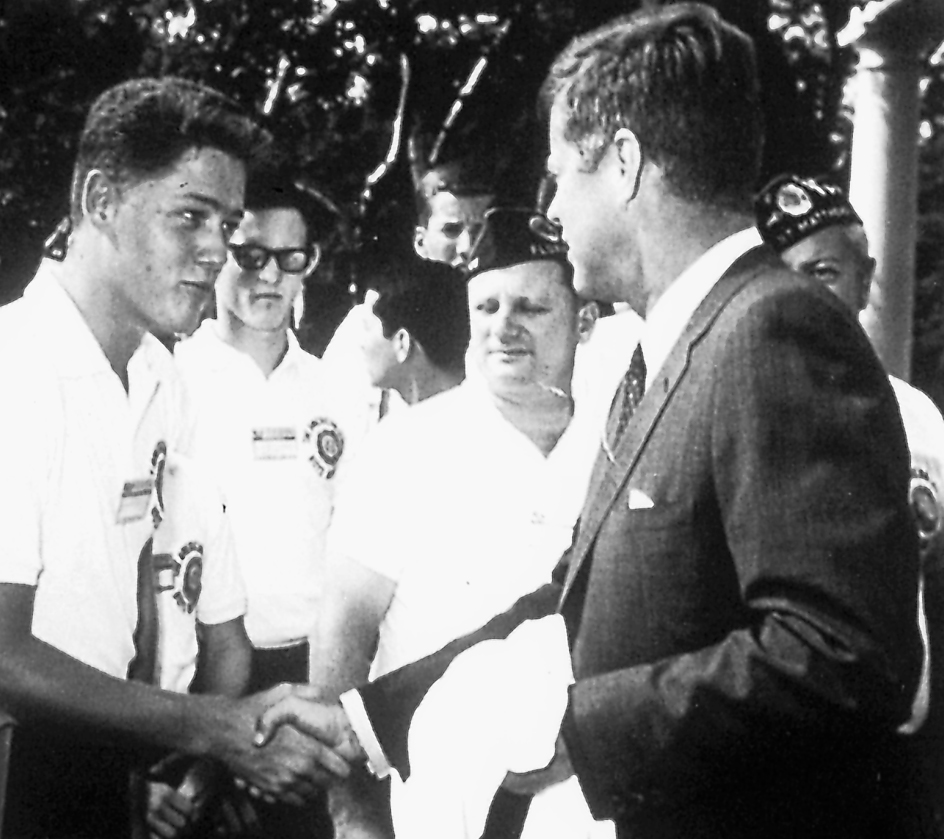
College and law school.
After graduating from high school in 1964, Clinton attended Georgetown University in Washington, D.C. He majored in international affairs. He served as class president during his freshman and sophomore years. From 1966 to 1968, he helped pay his college expenses through a job with the Senate Foreign Relations Committee.
Clinton had been strongly influenced by African Americans’ fight for social justice during the civil rights movement of the 1950’s and 1960’s. In April 1968, the assassination of civil rights leader Martin Luther King, Jr., led to rioting in Washington. Clinton worked as a Red Cross volunteer during the rioting, helping to bring food and clothing to people whose homes had been burned. He graduated from college a few months later.
Following his graduation, Clinton entered Oxford University in Oxford, England, as a Rhodes scholar. He remained at Oxford for two years. Clinton entered Yale Law School in 1970. From August to November 1972, he worked in Texas as a state coordinator for the presidential nomination of George McGovern.
Clinton’s family.
At Yale, Clinton met fellow law student Hillary Rodham (Oct. 26, 1947-…) of Park Ridge, Illinois. Hillary and Bill began to date in 1971 and were married on Oct. 11, 1975. The couple had one child—a daughter, Chelsea (1980-…). After the marriage, Hillary continued to pursue her own career as an attorney, eventually becoming one of the nation’s most prominent lawyers. She also played an active role in public affairs. She remained known as Hillary Rodham until 1982, when she adopted her husband’s last name. 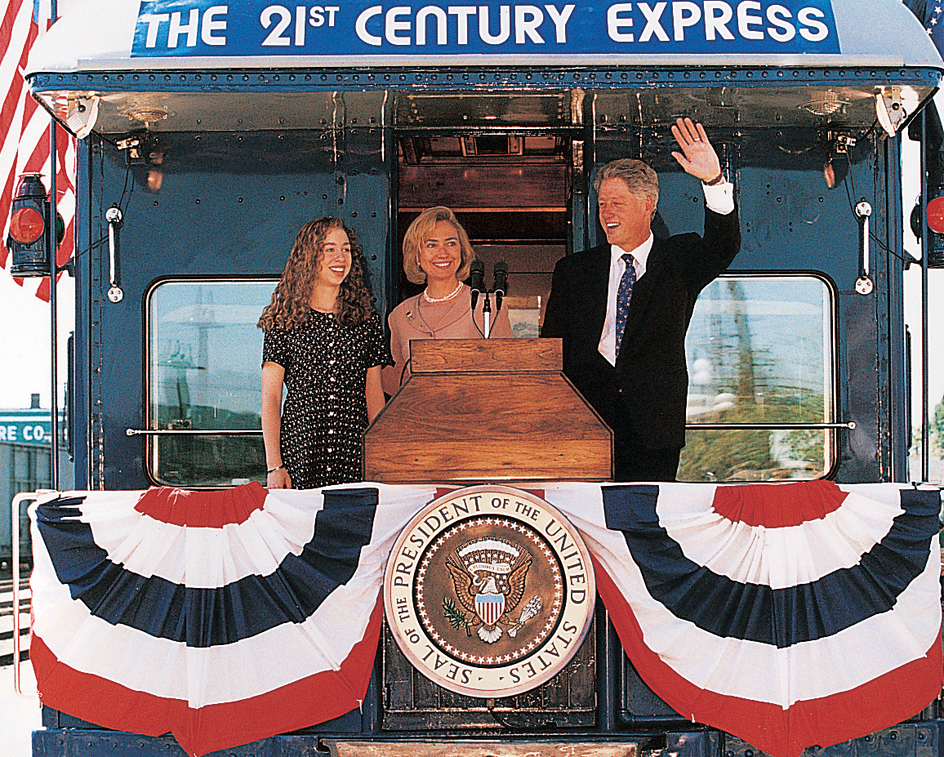
Entry into politics
After receiving his law degree in 1973, Clinton returned to Arkansas. There, he joined the faculty of the University of Arkansas Law School in Fayetteville. Soon afterward, he decided to run for a seat in the U.S. House of Representatives. In 1974, Clinton became the Democratic nominee to represent Arkansas’s Third Congressional District, which includes Fayetteville. Representative John Paul Hammerschmidt, a popular Republican, narrowly defeated Clinton in the general election.
In 1976, Clinton won the Democratic primary for attorney general of Arkansas. He ran unopposed in the general election. As attorney general, Clinton became known as a supporter of consumers’ interests. He opposed the construction by an Arkansas utility company of two large coal-burning power plants, demanding that the company promote efficiency and conservation instead. The plants were eventually built.
Clinton became a candidate for governor of Arkansas in early 1978. In his campaign, he partly focused on a need for economic development and improvements in the state’s educational system. Clinton overwhelmed his four Democratic opponents in the primary, winning 60 percent of the vote. He easily defeated Republican Lynn Lowe in the general election. Clinton’s impressive showing, combined with his liberal policies and his youth, brought him his first national attention.
Governor of Arkansas, 1979-1981
Early difficulties.
Clinton was inaugurated governor in January 1979. Once in office, he began efforts to establish a wide range of programs and policies. But he failed to gather broad support for these efforts, and most of them met with little success. To pay for a road improvement program, Clinton pushed through the legislature a measure increasing various fees and taxes, including motor vehicle license fees. The increase in license fees was extremely unpopular. Clinton also came under attack by local leaders, who said he failed to attract industries to the state. In addition, the powerful wood-products industry began working against Clinton because his administration had condemned one of its timber-management practices, called clearcutting.
Reelection defeat.
Clinton ran for reelection in 1980 against conservative Republican Frank D. White, a savings and loan executive. White stressed Clinton’s unpopular license fee increase. White also profited from a federal government decision to hold about 18,000 Cuban refugees temporarily at Fort Chaffee, then a military reserve training facility, near Fort Smith, Arkansas. In May and June 1980, discontent among the Cubans led to breakouts and rioting. White claimed that Clinton had not done enough to persuade President Jimmy Carter to hold the Cubans elsewhere. In the election, White gained 52 percent of the vote to Clinton’s 48 percent. Clinton then returned to private life, joining the law firm of Wright, Lindsey and Jennings in Little Rock, Arkansas. He began making plans to challenge White in 1982.
Governor of Arkansas, 1983-1992
Return to office.
In his 1982 campaign, Clinton worked to convince voters that he understood his mistakes and had matured. He failed to win a majority of the votes in the Democratic primary, but he won the nomination in a runoff. In the general election, Clinton defeated White by 55 percent to 45 percent of the vote. Clinton returned to office in January 1983. In his second term, he abandoned some strongly liberal positions. In addition, he decided to focus on two main problems—education and the economy—instead of a wide range of issues.
Clinton’s opponents argued that his 1980 defeat had taught him to avoid taking stands that might be unpopular. But Clinton was reelected in 1984 and in 1986, each time by a wide margin. In 1984, Arkansas passed a constitutional amendment changing the governor’s term of office from two years to four, beginning with the 1986 election. Clinton was elected to a fifth term in 1990.
Reforms in education.
Beginning in 1983, Clinton set as his main goal the improvement of the Arkansas public school system. Arkansas had long ranked near the bottom of the states in many measures of educational achievement. During his first term, Clinton had taken steps toward improving education in Arkansas. In one such move, he proposed a bill—passed into law in 1979—that required new teachers to pass a certifying examination before being allowed to teach.
In 1983, at Clinton’s urging, the legislature passed a series of educational reforms. These reforms included a requirement—the first of its kind in the nation—that teachers pass a basic skills test to keep their jobs.
Economic developments.
Arkansas had traditionally been a state with few major resources and an underdeveloped economy. It had relied heavily on low-skill, low-paying manufacturing jobs. During his first term, Clinton had sought unsuccessfully to reduce the state’s dependence on manufacturing jobs. After his reelection, he worked instead to broaden its industrial base. In 1985, at his urging, the legislature passed an economic package designed to attract businesses and capital to Arkansas. His actions helped Arkansas reduce unemployment and increase production in the late 1980’s and early 1990’s.
Steps to the presidency.
Throughout his years as governor, Clinton played an active role in Democratic Party politics. In 1985, he was elected vice chairman of the National Governors’ Association (NGA), made up of the governors of the 50 states and 5 U.S. territories. Clinton served as NGA chairman in 1986 and 1987. In 1990 and 1991, he headed the Democratic Leadership Council, an organization of moderate Democratic officeholders from all levels of government, as well as business and community members. In 1987 and 1988, Clinton worked to obtain the support of Congress and President Ronald Reagan for the NGA’s proposals on welfare reform. The proposals led to passage of the Family Support Act of 1988, which required welfare mothers to work if they had no children under 3 years of age.
At the Democratic National Convention in 1988, Clinton gave the speech nominating Michael S. Dukakis as the party’s candidate for president. Dukakis lost the election to Bush, then vice president.
Election as president
The Democratic nomination.
The Democratic nomination. In October 1991, Clinton formally announced his candidacy for the Democratic nomination for president. His chief challengers for the nomination were former Massachusetts Senator Paul E. Tsongas and former California Governor Edmund G. Brown, Jr., known as Jerry.
For a time, Clinton’s campaign faltered over charges of marital infidelity. The Clintons acknowledged that they had encountered some difficulties in their relationship, but they said their marriage was strong. Clinton also came under attack for his actions during the early 1970’s, which, his opponents charged, showed that he had sought to evade military service during the Vietnam War (1957-1975). Clinton denied that he had acted improperly, and his campaign rapidly regained ground. Tsongas, an early front-runner, suspended his campaign for lack of funds in March 1992. Clinton had already seized a commanding lead over Brown, and he soon had enough delegates to ensure the nomination.
At the Democratic National Convention in New York City in July 1992, Clinton was named the Democratic presidential nominee. At his request, Senator Al Gore of Tennessee was nominated for vice president. The Republicans renominated President Bush and Vice President Dan Quayle to oppose Clinton and Gore.
The 1992 election.
During the presidential campaign, Clinton took advantage of many Americans’ perception of Bush as unconcerned about domestic issues. He seized upon the high unemployment rate and the widespread belief that the gap between rich and poor had grown under Bush and his predecessor, Ronald Reagan. Clinton promised to stimulate the economy by encouraging business expansion in various ways, including tax breaks for new factories, new technology, and new small businesses. He proposed to reduce government spending and to raise taxes on wealthy Americans to help reduce the federal budget deficit.
Bush charged that Clinton lacked experience in foreign affairs. He defended his record on the economy, claiming that Congress—which was made up largely of Democrats—had rejected most of his proposals.
Texas businessman Ross Perot ran for president as an independent. Clinton defeated Bush and Perot.
Clinton’s first administration (1993-1997)
National affairs.
Clinton appointed more women and minority members to his Cabinet than had any previous president. Early in his presidency, he concentrated on the economy and other domestic issues.
Loading the player...Bill Clinton's first inaugural address
In October 1993, Clinton sent Congress a plan for sweeping reform of the nation’s health care system. A committee headed by Hillary Clinton had developed the plan. After much debate, Congress chose not to act on the proposal. In August 1996, however, Congress approved the Kennedy-Kassebaum bill, which included two important parts of Clinton’s 1993 plan. The bill provided (1) that workers can change jobs without losing their medical insurance coverage, and (2) that workers cannot be denied medical insurance coverage because of a preexisting illness.
In November 1993, Congress approved the “Brady bill,” which Clinton backed strongly. The bill required people to wait five working days between the time they bought a handgun and the time they took possession of it. In August 1994, Clinton won a victory when Congress passed an anticrime law he supported. The law called for spending billions of dollars on crime prevention, law enforcement, and prison construction. It also banned the sale of certain types of assault weapons, guns that many people believe are designed specifically for killing or injuring people. The assault weapons ban expired in 2004.
The unemployment rate declined after Clinton became president. Clinton’s 1993 and 1994 budgets included cuts in government spending and tax increases that helped reduce the federal deficit. They were approved by Congress, which had a Democratic majority. In the elections of November 1994, however, the Democrats lost control of Congress to the Republicans. The Republicans called for larger spending cuts, with the goal of erasing the deficit by the year 2002. Clinton said some of the proposed cuts were too sharp, including those for spending on education, welfare, and Medicare. He responded with his own plan to wipe out the deficit.
By the start of the government’s new fiscal year on Oct. 1, 1995, Congress had failed to pass some of the appropriations bills that fund the government’s operations. It then passed a series of bills to allow spending to continue for short periods. But the bills included certain other provisions that Clinton opposed. For example, one bill increased Medicare premiums. Clinton vetoed bills with provisions he opposed, and Congress refused to remove the provisions. The resulting lack of funding forced many federal government operations to shut down for 6 days in November and for 21 days from December 1995 to January 1996.
As president, Clinton pressed for actions to keep young people from starting to smoke. He and his administration worked to persuade Congress to create federal restrictions on smoking by people under the age of 21.
Most Americans believed the nation’s welfare system had shortcomings, including that of encouraging people to stay on welfare rather than working. In his 1992 campaign, Clinton had pledged to solve the problems, saying he wanted to “end welfare as we know it.” In 1996, Congress created legislation to revise the welfare system. Clinton vetoed two bills, claiming they included changes that would harm the poor too much. But he approved a third welfare bill in August 1996, upsetting many in his own party. The bill placed limits on how long people can receive welfare benefits, and it shifted much responsibility for administering welfare from the federal government to the states.
Clinton called for an increase in the legal minimum wage. Congress approved an increase in August 1996.
During his presidency, Clinton struggled to clear himself of charges of financial misconduct. The charges centered on alleged illegal and unethical acts by the Whitewater Development Corporation, a small company that bought land in Arkansas for a vacation home development. The Clintons had invested in the company in 1978, shortly before Clinton was elected governor of Arkansas, and sold their interest in the company in 1992. They denied any wrongdoing and pointed out that they had lost a large sum of money on their investment. But Clinton promised a full investigation.
In January 1994, Attorney General Janet Reno appointed a Republican lawyer, Robert B. Fiske, as an independent counsel to investigate the Whitewater affair. In August 1994, a panel of federal judges appointed another Republican lawyer, Kenneth W. Starr, to take Fiske’s place. Republicans had charged that Fiske was favoring the Clinton administration.
International affairs
presented Clinton with many challenges. In August 1994, he ended a long-standing U.S. policy of accepting almost all refugees from Communist Cuba. He abandoned the old policy after thousands of Cubans set out for southern Florida on small boats and rafts to escape poverty in Cuba. Clinton’s action was designed, in part, to avoid the cost of settling large numbers of refugees in the United States.
Since the last years of Bush’s presidency, thousands of refugees from Haiti had also tried to reach the United States by sea. They left Haiti after Haiti’s military overthrew Jean-Bertrand Aristide, the nation’s first democratically elected president, in 1991. The new rulers set up a military dictatorship.
In September 1994, Clinton threatened to use armed force against Haiti’s rulers if they did not allow Aristide to return to power. As U.S. forces prepared to invade Haiti, Haiti’s top military leader, Lieutenant General Raoul Cedras, agreed to step down and allow Aristide’s return. The agreement was negotiated by a U.S. team led by former President Jimmy Carter, whom Clinton had sent to Haiti as his representative. United States troops were sent to help ensure the transfer of power to Aristide.
Clinton achieved one of his major foreign policy goals in November 1993, when Congress approved the North American Free Trade Agreement (NAFTA). Clinton strongly supported the pact, which will gradually eliminate tariffs and other trade barriers between the United States, Mexico, and Canada. In December 1994, Clinton won Congress’s approval of an expansion of the General Agreement on Tariffs and Trade (GATT). This expanded GATT plan called for large reductions in trade barriers among many nations.
The United States and other countries have long claimed that Japan’s trade practices unfairly restrict imports to that country. In 1995, Clinton threatened increases in tariffs on Japanese luxury cars. Japanese car companies then agreed to try to improve their practices.
In 1992, a civil war began in Bosnia-Herzegovina between Bosnian Serb rebels and the country’s government, which was dominated by Bosniaks (sometimes called Bosnian Muslims). Bosnia-Herzegovina, sometimes simply called Bosnia, was formerly a republic of Yugoslavia. In 1991, the United Nations (UN) had approved an embargo against providing arms to any of the former Yugoslav republics to try to keep fighting from spreading in the area. The UN sent a peacekeeping force to Bosnia. The United States used its Air Force to help provide relief to Bosniaks under siege and to try to stop Serb aggression.
Televised brutal actions by Serbs in the Bosnian civil war caused many people in the United States to favor providing arms to the Bosniaks. Clinton continued to follow the UN arms embargo policy, however. In August 1995, Congress voted to require Clinton to end U.S. participation in the arms embargo if the UN force in Bosnia pulled out. Clinton vetoed the legislation.
In late 1995, Clinton helped bring about a meeting of representatives of the sides in the Bosnian civil war. In December, they signed a peace plan that included a cease-fire. Under the plan, the cease-fire was to be policed by a force of troops from the North Atlantic Treaty Organization (NATO). Clinton agreed to send United States troops to Bosnia to serve in the force.
In 1991, a coalition of nations led by the United States had driven Iraqi forces out of Kuwait after the Iraqis had occupied that country. The coalition then placed restrictions on Iraq. But in September 1996, Iraqi forces attacked Kurds in northern Iraq in violation of the restrictions. In response, Clinton ordered the U.S. military to launch missiles against military targets in Iraq.
Life in the White House.
The Clintons often hosted small dinners and occasionally had overnight guests at the White House. They especially enjoyed inviting friends to watch a movie with them in the White House theater. They worked to maintain as normal a lifestyle as possible for their teen-age daughter, Chelsea, who attended a private school in Washington, D.C, during Clinton’s first term. In 1997, Chelsea left for college. She went to Stanford University and graduated in 2001, after Clinton left office.
Mrs. Clinton played an active role during the Clinton administration. For example, she chaired the task force on national health care reform. She also took a special interest in the problems of children and families. Her book It Takes a Village (1996) calls for community participation in helping children develop.
The 1996 election.
At the Democratic National Convention in Chicago in August 1996, Clinton and Gore were renominated without opposition. The Republicans nominated Robert Dole of Kansas for president and Jack Kemp of New York for vice president. Ross Perot ran for president on the Reform Party ticket. 
In the presidential campaign, Clinton pointed to his first-term record, emphasizing improvements in the economy and such laws as gun control measures and the minimum-wage increase. He also said he had kept Congress from cutting some government programs too deeply, including Medicare, welfare, and education. In November, the voters reelected Clinton and Gore.
Clinton’s second administration (1997-2001)
International affairs.
In 1998, Clinton visited China, where he urged its leaders to allow a greater degree of democracy. Also in 1998, Clinton called for increased controls on nuclear weapons after India and Pakistan tested such weapons. In August 1998, bombs planted by terrorists destroyed the U.S. embassies in Kenya and Tanzania. American officials said that terrorists camped in Afghanistan and led by Osama bin Laden, a wealthy Saudi-born businessman, were responsible for the bombings. Clinton ordered missile strikes against the camps in Afghanistan and a plant in Sudan suspected of making deadly nerve gas for terrorists.
In December 1998, Clinton ordered U.S. forces to launch missile strikes against military and industrial sites in Iraq. Clinton said he ordered the strikes because Iraq had failed to cooperate with United Nations (UN) inspection of suspected weapons facilities. UN officials feared that the Iraqi facilities contained or could be used to produce chemical, biological, or other weapons of mass destruction. Iraq had agreed to such inspections after its defeat by U.S.-led forces in 1991.
In March 1999, NATO began air strikes against Yugoslavia to halt Yugoslav attacks against ethnic Albanians in Kosovo, then a province of the Yugoslav republic of Serbia. The air campaign used primarily U.S. aircraft and cruise missiles. Clinton said there was no alternative to military intervention because Yugoslavia refused to halt its attacks. But in June 1999, Yugoslav military leaders agreed to withdraw their troops. NATO stopped the bombing and sent an international peacekeeping force to Kosovo. The United States pledged 7,000 troops.
In 2000, Congress passed a bill calling for permanent normal trading relations with China. Clinton had campaigned tirelessly to achieve passage of the bill. Many members of Congress had opposed the bill in protest against China’s record in the area of human rights. But Clinton argued that opening markets between the United States and China would not only increase jobs and prosperity in the United States, but also help spread democratic values abroad.
In mid-2000, the United States and Vietnam signed an agreement opening the way for normal trade relations. The agreement called for the two nations to lower tariffs between themselves. Congress approved the agreement in 2001, after Clinton had left office.
Domestic events.
The Republican Party kept control of both houses of Congress as a result of the 1996 elections. In August 1997, Clinton and the Republican-controlled Congress reached a compromise on the budget. The two sides agreed to a plan to end the deficit by 2002. In 1998, however, the government beat the 2002 deadline. That year, a strong economy helped lead to a $70-billion budget surplus. The surplus was the first achieved by the federal government since 1969.
Clinton continued to appoint women and minorities to important posts. In 1996, he named Madeleine K. Albright secretary of state. Albright, who took office in 1997, became the first woman to head the Department of State. Bill Richardson, another Clinton appointee, became the first Hispanic American to serve as the head U.S. delegate to the United Nations. Norman Mineta, appointed secretary of commerce in 2000, was the first Asian American to serve in the Cabinet.
In 1994, a former Arkansas state employee named Paula Corbin Jones filed a sexual harassment suit against Clinton. Jones claimed that in 1991, when Clinton was governor of Arkansas, he had requested sexual favors from her. In April 1998, a federal judge dismissed the Jones case, ruling there was not enough evidence of sexual harassment to send the case to a jury. Jones appealed this verdict. In December 1998, while the appeal was being heard, Clinton agreed to a cash settlement for Jones, and Jones dropped the appeal.
While preparing Jones’s case, her lawyers had tried to establish a pattern of sexual affairs between the president and female employees. As part of this effort, they took testimony from a former White House intern named Monica Lewinsky, whom they suspected of having an affair with Clinton from late 1995 to early 1997. In January 1998, Kenneth Starr, who was still investigating the Whitewater case, asked Attorney General Janet Reno to expand his authority to allow him to investigate the Lewinsky matter, and she consented. Linda Tripp, a friend of Lewinsky’s, had given Starr audiotapes on which Lewinsky reportedly discussed an affair with Clinton. In sworn statements to Jones’s lawyers, Clinton and Lewinsky both denied having a sexual relationship.
In July, Clinton agreed to submit to questioning before a grand jury about whether he had urged Lewinsky to lie. If proven, such an action eventually could have led to criminal charges of obstruction of justice and subornation of perjury (persuading a witness to lie in court). Clinton testified before the grand jury on August 17. That night, he told the nation on television that he had had a relationship with Lewinsky that was not appropriate. He said it was a personal failure.
Starr sent his final report to the House of Representatives. The report suggested that Clinton may have committed impeachable offenses in trying to conceal his relationship with Lewinsky. In December 1998, the House impeached Clinton for perjury and obstruction of justice. The Senate then conducted a trial to consider the charges and Clinton’s removal from office. In February 1999, the Senate found Clinton not guilty, and Clinton remained in office.
In October 1999, Kenneth Starr stepped down as independent counsel. One of his assistants, Robert W. Ray, took over the task of completing a final report on the Whitewater investigation. In September 2000, Ray officially ended the investigation with a statement that there was insufficient evidence to show that either of the Clintons had committed a criminal offense.
However, the possibility remained that after Bill Clinton left office, Ray would seek to bring criminal charges against him for lying under oath in the Lewinsky affair. In January 2001, just before leaving office, Clinton signed a statement acknowledging that he had given “evasive and misleading answers” under oath about his involvement with Lewinsky. As a punishment, he agreed to have his Arkansas law license suspended for five years and to pay a fine of $25,000.
Ray’s final reports on Whitewater and the Lewinsky affair became public in 2002, more than a year after Clinton’s presidency had ended. The Whitewater report restated that there was insufficient evidence to show that the Clintons had engaged in criminal wrongdoing. In the Lewinsky report, however, Ray concluded that there was ample evidence to convict Bill Clinton of perjury and obstruction of justice. Ray said he chose not to bring charges in the matter because he believed Clinton had already been punished enough.
Later years
After Clinton left the White House, he and his wife lived in the state of New York. Mrs. Clinton had been elected in November 2000 to represent the state in the U.S. Senate. Bill Clinton opened an office in the Harlem neighborhood of New York City. In 2002, he started the William J. Clinton Foundation. In 2013, the foundation changed its name to the Bill, Hillary & Chelsea Clinton Foundation. It has offices in Harlem, Boston, and Little Rock. It works on projects involving such issues as AIDS, poverty, and climate change.
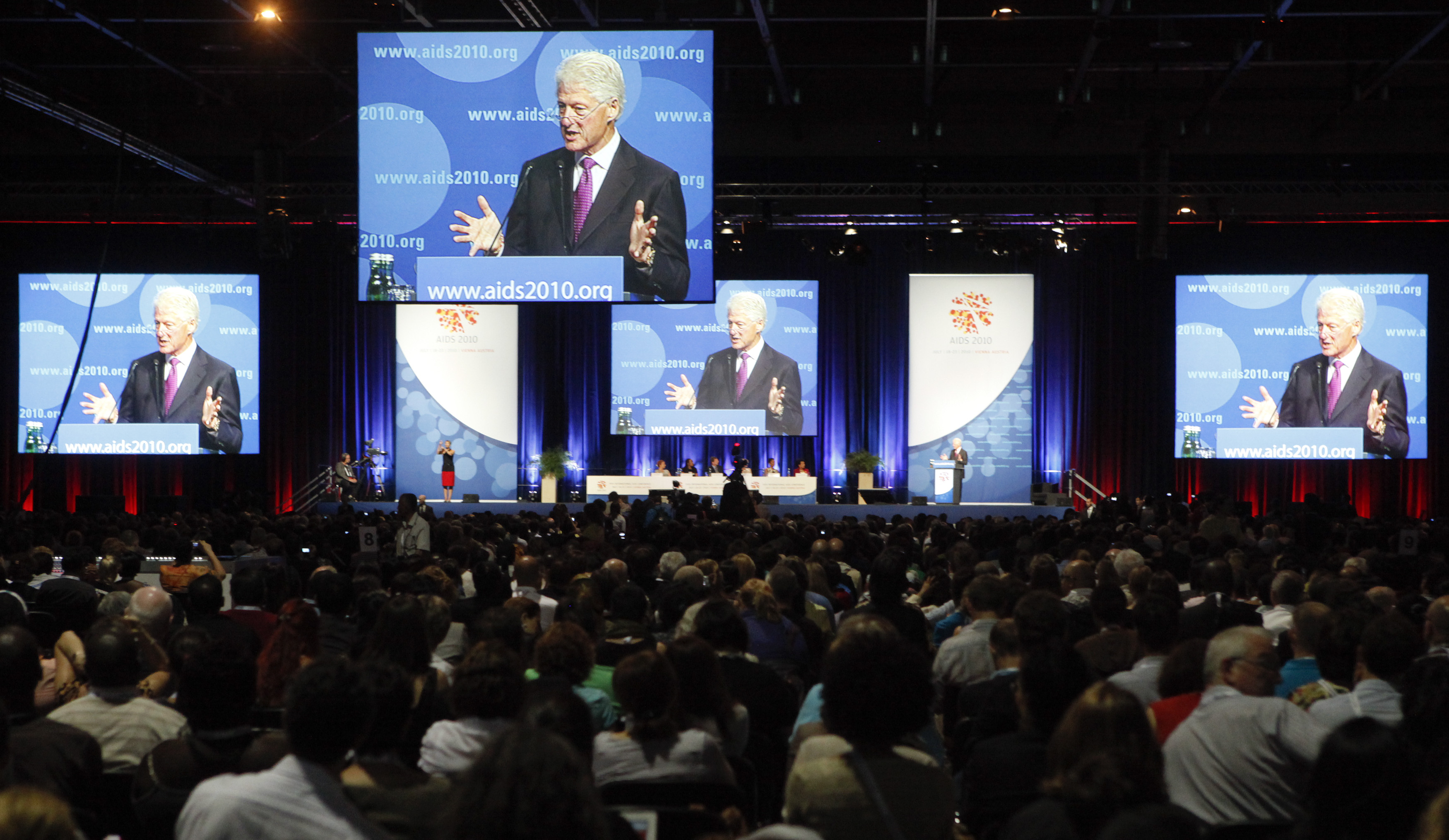
Clinton spent much of his time traveling, giving speeches to groups and organizations, and writing. His autobiography, My Life, was published in 2004.
In September 2004, Clinton underwent coronary bypass surgery to repair heart disease and extensive blockage in his arteries. Clinton made a full recovery after the surgery.
In December 2004, the William J. Clinton Presidential Center opened in Little Rock, Arkansas. The center includes a library and museum, and it also houses the University of Arkansas Clinton School of Public Service.
In January 2005, President George W. Bush involved Clinton in disaster relief efforts. In December 2004, a powerful undersea earthquake in the Indian Ocean had created a series of huge ocean waves called a tsunami. The tsunami’s towering waves swept over the coasts of a number of Asian and African countries. About 228,000 people were killed, and millions were left homeless. Bush appointed his father, former President George H. W. Bush, and Clinton to head efforts to raise funds for the tsunami victims. In February, Kofi Annan, secretary-general of the United Nations, chose Clinton as his special envoy to the countries struck by the tsunami. Annan hoped Clinton could sustain world interest in the affected countries during the period of recovery and rebuilding. Clinton’s service as special envoy ended in December 2006.
In September 2005, President George W. Bush again involved Clinton in disaster relief. In August 2005, Hurricane Katrina struck the Gulf Coast, causing widespread death and destruction. Bush appointed his father and Clinton to head efforts to raise funds for hurricane victims.
In 2007, Clinton’s book Giving: How Each of Us Can Change the World was published. The book highlights the charitable works of organizations and private citizens. His book Back to Work: Why We Need Smart Government for a Strong Economy (2011) offered his prescription for reviving the U.S. economy. Clinton later wrote a suspense novel, The President Is Missing (2018), with the writer James Patterson.
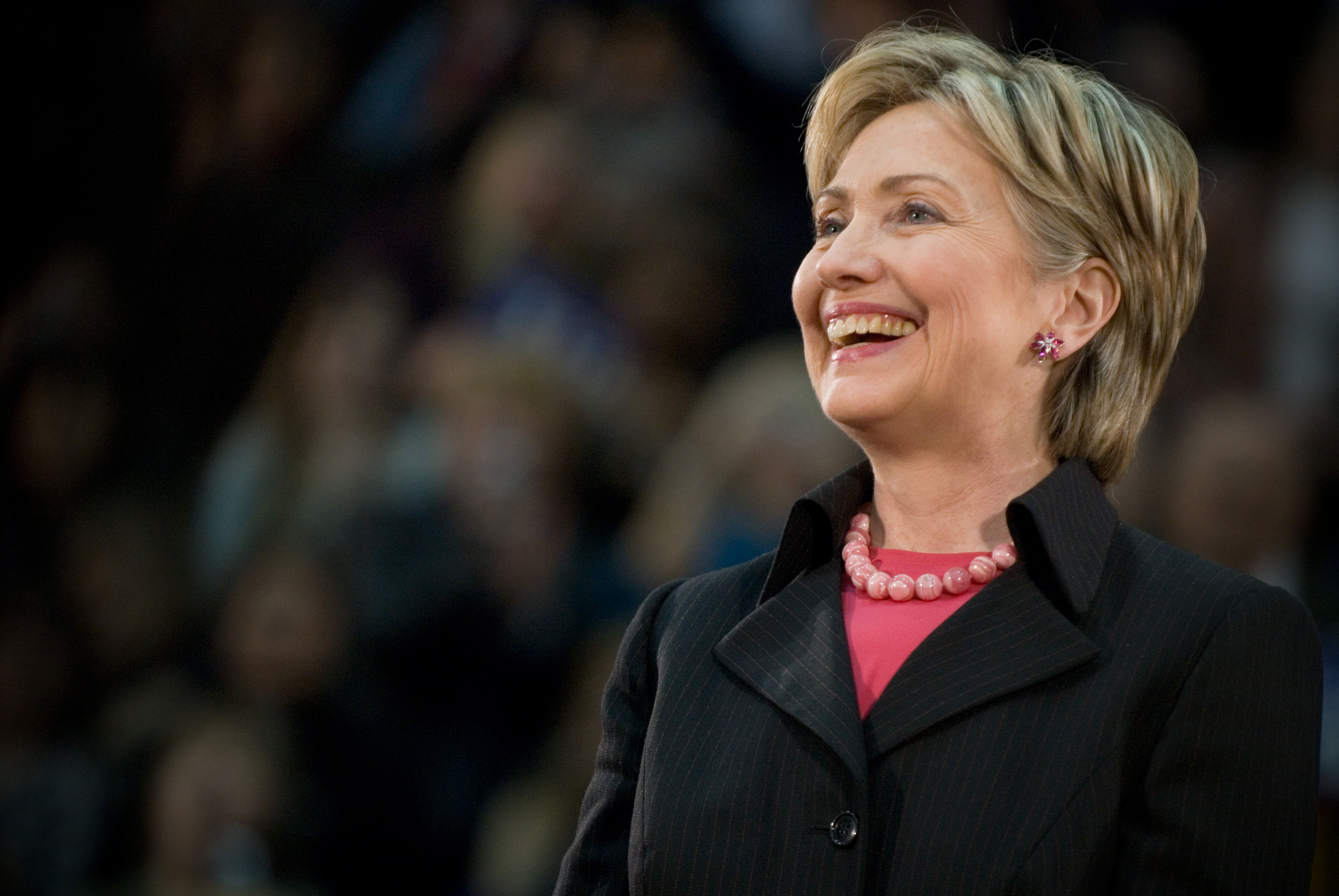
In January 2010, an earthquake struck the nation of Haiti in the Caribbean Sea, causing tremendous devastation and thousands of deaths. President Obama involved Bill Clinton in disaster relief. Clinton joined with former President George W. Bush to lead a fund-raising effort to aid earthquake victims. In 2013, President Obama awarded Clinton the Presidential Medal of Freedom for his charitable efforts and achievements in government. The medal is one of the country’s highest civilian honors.
